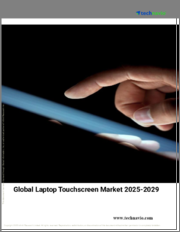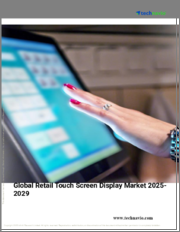
|
시장보고서
상품코드
1722939
멀티 터치스크린 시장 규모, 점유율, 동향, 예측 : 제품, 기술, 용도, 지역별(2025-2033년)Multi-touch Screen Market Size, Share, Trends and Forecast by Product, Technology, Application, and Region, 2025-2033 |
||||||
멀티 터치스크린 세계 시장 규모는 2024년에 149억 달러에 달했습니다. 향후 IMARC Group은 이 시장이 2033년까지 383억 달러에 달하고, 2025-2033년 11.04%의 연평균 복합 성장률(CAGR)을 보일 것으로 예측했습니다. 현재 북미가 시장을 독점하고 있으며, 2024년에는 33.5% 이상의 높은 시장 점유율을 차지했습니다. 멀티 터치 스크린 시장 점유율은 주로 가전, 자동차, 산업 분야 수요 증가, 터치 감도, 내구성, 멀티 터치 기능의 진화, 스마트폰, 태블릿, 인터랙티브 디스플레이의 채택 증가로 인해 이 지역 전체에서 빠르게 성장하고 있습니다.
멀티 터치스크린은 하나의 화면에서 여러 위치에서 제스처나 압력을 감지하고 반응할 수 있는 디스플레이 장치를 말합니다. 주문형 반도체(ASIC) 컨트롤러, 정전식 터치센서, 디지털 신호 프로세서(DSP)로 구성됩니다. 또한 디스플레이 지원, 감지 방법, 센서, 보정 시스템 등 다양한 소프트웨어와 하드웨어를 통합하여 인터랙티브한 경험을 제공합니다. 멀티 터치스크린은 키오스크 단말기, 스마트폰, 노트북, 개인용 컴퓨터(PC), 태블릿PC 등에서 일반적으로 사용됩니다. 적외선, 저항막 방식, 정전 용량 방식, 광학식 등 다양한 기술이 활용되고 있습니다. 기존의 터치스크린에 비해 멀티터치스크린은 속도가 빠르고, 다수의 터치 입력을 구분할 수 있으며, 기능성, 편의성, 속도가 향상되고, 사용이 편리합니다. 그 결과, 멀티 터치스크린은 가전제품, 교육센터, 정부기관 등에서 널리 사용되고 있습니다.
멀티 터치스크린 시장 동향 :
세계 전자 산업의 대폭적인 성장으로 시장 전망은 매우 밝습니다. 멀티 터치 스크린은 태블릿, 스마트폰, 노트북 등 다양한 전자 기기에 널리 사용되어 피드백 및 감지 시스템을 강화하고 있습니다. 이에 따라 전반적인 사용자 경험을 향상시키기 위해 멀티 터치 스크린이 탑재된 휴대용 장치 및 손목시계와 같은 스마트 웨어러블에 대한 수요가 증가하고 있으며, 이는 시장 성장에 긍정적인 영향을 미치고 있습니다. 또한, 센싱 기능을 향상시킨 비용 효율적인 멀티 터치스크린 디스플레이의 도입이 시장 성장에 탄력을 받고 있습니다. 또한, 고객 참여 및 브랜딩을 목적으로 한 소매 및 미디어 용도에서 제품 사용이 증가하고 있는 것도 시장 성장에 긍정적인 영향을 미치고 있습니다. 기타 요인으로는 플렉서블 터치스크린 패널의 도입, 소비자 지출 능력 증가, 광범위한 R&D 활동 등이 시장 성장을 견인할 것으로 예측됩니다.
본 보고서에서 다룬 주요 질문
- 멀티 터치스크린 시장 규모는?
- 멀티 터치스크린 시장 전망은?
- 멀티 터치스크린 시장을 주도하는 주요 요인은?
- 멀티 터치스크린 시장에서 가장 큰 점유율을 차지하는 지역은?
- 세계 멀티 터치스크린 시장의 주요 업체는?
목차
제1장 서문
제2장 조사 범위와 조사 방법
- 조사 목적
- 이해관계자
- 데이터 소스
- 1차 정보
- 2차 정보
- 시장 추정
- 보텀업 접근
- 톱다운 접근
- 조사 방법
제3장 주요 요약
제4장 서론
- 개요
- 주요 업계 동향
제5장 세계의 멀티 터치스크린 시장
- 시장 개요
- 시장 실적
- COVID-19의 영향
- 시장 예측
제6장 시장 분석 : 제품별
- 스마트폰
- 태블릿
- 노트북
- TV 키오스크
- 대형 인터랙티브 스크린
제7장 시장 분석 : 기술별
- 저항형
- 정전용량식
- 적외선
- 광학
- 기타
제8장 시장 분석 : 용도별
- 소비자 일렉트로닉스
- 소매
- 교육
- 기타
제9장 시장 분석 : 지역별
- 북미
- 미국
- 캐나다
- 아시아태평양
- 중국
- 일본
- 인도
- 한국
- 호주
- 인도네시아
- 기타
- 유럽
- 독일
- 프랑스
- 영국
- 이탈리아
- 스페인
- 러시아
- 기타
- 라틴아메리카
- 브라질
- 멕시코
- 기타
- 중동 및 아프리카
- 시장 내역 : 국가별
제10장 SWOT 분석
- 개요
- 강점
- 약점
- 기회
- 위협
제11장 밸류체인 분석
제12장 Porter의 Five Forces 분석
- 개요
- 바이어의 교섭력
- 공급 기업의 교섭력
- 경쟁 정도
- 신규 진출업체의 위협
- 대체품의 위협
제13장 가격 분석
제14장 경쟁 구도
- 시장 구조
- 주요 기업
- 주요 기업 개요
- 3M Company
- Apple Inc.
- Corning Incorporated
- Fujitsu Limited
- HP Inc.
- Immersion Corporation
- Infineon Technologies AG
- Japan Display Inc.(Sony Corporation)
- LG Electronics Inc.
- Microchip Technology Inc.
- Microsoft Corporation
- Panasonic Corporation
- Samsung Electronics Co. Ltd.
- Sharp Corporation
The global multi-touch screen market size was valued at USD 14.9 Billion in 2024. Looking forward, IMARC Group estimates the market to reach USD 38.3 Billion by 2033, exhibiting a CAGR of 11.04% during 2025-2033. North America currently dominates the market, holding a significant market share of over 33.5% in 2024. The multi-touch screen market share is growing rapidly across the region mainly driven by increasing demand across consumer electronics, automotive and industrial sectors, advancements in touch sensitivity, durability, and multi-touch capabilities, and rising adoption of smartphones, tablets, and interactive displays.
Multi-touch screen refers to display devices that can sense and respond to gestures and pressures at several locations on a single screen. It consists of an application-specific integrated circuit (ASIC) controller, capacitive touch sensor, and digital signal processor (DSP). It also includes various software and hardware integrations, including display support, sensing methods, sensors and calibration systems to create interactive experiences. Multi-touch screens are commonly used in kiosks, smartphones, laptops, personal computers (PCs) and tablets. It utilizes various technologies, such as infrared, resistive, capacitive, and optical. As compared to conventional touch screens, multi-touch screens are faster, can distinguish between numerous touch inputs, provides enhanced functionality, convenience, and speed, and are easier to use. As a result, multi-touch screens are widely used in consumer electronics, education centers, and government organizations.
Multi-touch Screen Market Trends:
Substantial growth in the electronic industry across the globe is creating a positive outlook for the market. Multi-touch screens are widely used in various electronics, such as tablets, smartphones, and laptops, to offer enhanced feedback and sensing system. In line with this, the increasing demand for portable devices and smart wearables, such as watches with multi-touch screens to enhance the overall user experience, is positively impacting the market growth. Furthermore, the introduction of cost-effective multi-touch screen displays with improved sense capabilities is providing an impetus to the market growth. Additionally, the increasing product utilization in retail and media applications for customer engagement and branding purposes is also favoring the market growth. Other factors, including the introduction of flexible touch screen panels, rising expenditure capacities of consumers and extensive research and development (R&D) activities, are anticipated to drive the market further toward growth.
Key Market Segmentation:
Breakup by Product:
- Smartphones
- Tablets
- Laptops
- Televisions Kiosks
- Large Interactive Screens
Breakup by Technology:
- Resistive
- Capacitive
- Infrared
- Optical
- Others
Breakup by Application:
- Consumer Electronics
- Retail
- Education
- Others
Breakup by Region:
- North America
- United States
- Canada
- Asia-Pacific
- China
- Japan
- India
- South Korea
- Australia
- Indonesia
- Others
- Europe
- Germany
- France
- United Kingdom
- Italy
- Spain
- Russia
- Others
- Latin America
- Brazil
- Mexico
- Others
- Middle East and Africa
Competitive Landscape:
The competitive landscape of the industry has also been examined along with the profiles of the key players being 3M Company, Apple Inc., Corning Incorporated, Fujitsu Limited, HP Inc., Immersion Corporation, Infineon Technologies AG, Japan Display Inc. (Sony Corporation), LG Electronics Inc., Microchip Technology Inc., Microsoft Corporation, Panasonic Corporation, Samsung Electronics Co. Ltd. and Sharp Corporation.
Key Questions Answered in This Report
- 1.How big is the multi-touch screen market?
- 2.What is the future outlook of multi-touch screen market?
- 3.What are the key factors driving the multi-touch screen market?
- 4.Which region accounts for the largest multi-touch screen market share?
- 5.Which are the leading companies in the global multi-touch screen market?
Table of Contents
1 Preface
2 Scope and Methodology
- 2.1 Objectives of the Study
- 2.2 Stakeholders
- 2.3 Data Sources
- 2.3.1 Primary Sources
- 2.3.2 Secondary Sources
- 2.4 Market Estimation
- 2.4.1 Bottom-Up Approach
- 2.4.2 Top-Down Approach
- 2.5 Forecasting Methodology
3 Executive Summary
4 Introduction
- 4.1 Overview
- 4.2 Key Industry Trends
5 Global Multi-touch Screen Market
- 5.1 Market Overview
- 5.2 Market Performance
- 5.3 Impact of COVID-19
- 5.4 Market Forecast
6 Market Breakup by Product
- 6.1 Smartphones
- 6.1.1 Market Trends
- 6.1.2 Market Forecast
- 6.2 Tablets
- 6.2.1 Market Trends
- 6.2.2 Market Forecast
- 6.3 Laptops
- 6.3.1 Market Trends
- 6.3.2 Market Forecast
- 6.4 Televisions Kiosks
- 6.4.1 Market Trends
- 6.4.2 Market Forecast
- 6.5 Large Interactive Screens
- 6.5.1 Market Trends
- 6.5.2 Market Forecast
7 Market Breakup by Technology
- 7.1 Resistive
- 7.1.1 Market Trends
- 7.1.2 Market Forecast
- 7.2 Capacitive
- 7.2.1 Market Trends
- 7.2.2 Market Forecast
- 7.3 Infrared
- 7.3.1 Market Trends
- 7.3.2 Market Forecast
- 7.4 Optical
- 7.4.1 Market Trends
- 7.4.2 Market Forecast
- 7.5 Others
- 7.5.1 Market Trends
- 7.5.2 Market Forecast
8 Market Breakup by Application
- 8.1 Consumer Electronics
- 8.1.1 Market Trends
- 8.1.2 Market Forecast
- 8.2 Retail
- 8.2.1 Market Trends
- 8.2.2 Market Forecast
- 8.3 Education
- 8.3.1 Market Trends
- 8.3.2 Market Forecast
- 8.4 Others
- 8.4.1 Market Trends
- 8.4.2 Market Forecast
9 Market Breakup by Region
- 9.1 North America
- 9.1.1 United States
- 9.1.1.1 Market Trends
- 9.1.1.2 Market Forecast
- 9.1.2 Canada
- 9.1.2.1 Market Trends
- 9.1.2.2 Market Forecast
- 9.1.1 United States
- 9.2 Asia-Pacific
- 9.2.1 China
- 9.2.1.1 Market Trends
- 9.2.1.2 Market Forecast
- 9.2.2 Japan
- 9.2.2.1 Market Trends
- 9.2.2.2 Market Forecast
- 9.2.3 India
- 9.2.3.1 Market Trends
- 9.2.3.2 Market Forecast
- 9.2.4 South Korea
- 9.2.4.1 Market Trends
- 9.2.4.2 Market Forecast
- 9.2.5 Australia
- 9.2.5.1 Market Trends
- 9.2.5.2 Market Forecast
- 9.2.6 Indonesia
- 9.2.6.1 Market Trends
- 9.2.6.2 Market Forecast
- 9.2.7 Others
- 9.2.7.1 Market Trends
- 9.2.7.2 Market Forecast
- 9.2.1 China
- 9.3 Europe
- 9.3.1 Germany
- 9.3.1.1 Market Trends
- 9.3.1.2 Market Forecast
- 9.3.2 France
- 9.3.2.1 Market Trends
- 9.3.2.2 Market Forecast
- 9.3.3 United Kingdom
- 9.3.3.1 Market Trends
- 9.3.3.2 Market Forecast
- 9.3.4 Italy
- 9.3.4.1 Market Trends
- 9.3.4.2 Market Forecast
- 9.3.5 Spain
- 9.3.5.1 Market Trends
- 9.3.5.2 Market Forecast
- 9.3.6 Russia
- 9.3.6.1 Market Trends
- 9.3.6.2 Market Forecast
- 9.3.7 Others
- 9.3.7.1 Market Trends
- 9.3.7.2 Market Forecast
- 9.3.1 Germany
- 9.4 Latin America
- 9.4.1 Brazil
- 9.4.1.1 Market Trends
- 9.4.1.2 Market Forecast
- 9.4.2 Mexico
- 9.4.2.1 Market Trends
- 9.4.2.2 Market Forecast
- 9.4.3 Others
- 9.4.3.1 Market Trends
- 9.4.3.2 Market Forecast
- 9.4.1 Brazil
- 9.5 Middle East and Africa
- 9.5.1 Market Trends
- 9.5.2 Market Breakup by Country
- 9.5.3 Market Forecast
10 SWOT Analysis
- 10.1 Overview
- 10.2 Strengths
- 10.3 Weaknesses
- 10.4 Opportunities
- 10.5 Threats
11 Value Chain Analysis
12 Porters Five Forces Analysis
- 12.1 Overview
- 12.2 Bargaining Power of Buyers
- 12.3 Bargaining Power of Suppliers
- 12.4 Degree of Competition
- 12.5 Threat of New Entrants
- 12.6 Threat of Substitutes
13 Price Analysis
14 Competitive Landscape
- 14.1 Market Structure
- 14.2 Key Players
- 14.3 Profiles of Key Players
- 14.3.1 3M Company
- 14.3.1.1 Company Overview
- 14.3.1.2 Product Portfolio
- 14.3.1.3 Financials
- 14.3.2 Apple Inc.
- 14.3.2.1 Company Overview
- 14.3.2.2 Product Portfolio
- 14.3.2.3 Financials
- 14.3.2.4 SWOT Analysis
- 14.3.3 Corning Incorporated
- 14.3.3.1 Company Overview
- 14.3.3.2 Product Portfolio
- 14.3.3.3 Financials
- 14.3.3.4 SWOT Analysis
- 14.3.4 Fujitsu Limited
- 14.3.4.1 Company Overview
- 14.3.4.2 Product Portfolio
- 14.3.4.3 Financials
- 14.3.4.4 SWOT Analysis
- 14.3.5 HP Inc.
- 14.3.5.1 Company Overview
- 14.3.5.2 Product Portfolio
- 14.3.5.3 Financials
- 14.3.5.4 SWOT Analysis
- 14.3.6 Immersion Corporation
- 14.3.6.1 Company Overview
- 14.3.6.2 Product Portfolio
- 14.3.6.3 Financials
- 14.3.7 Infineon Technologies AG
- 14.3.7.1 Company Overview
- 14.3.7.2 Product Portfolio
- 14.3.7.3 Financials
- 14.3.7.4 SWOT Analysis
- 14.3.8 Japan Display Inc. (Sony Corporation)
- 14.3.8.1 Company Overview
- 14.3.8.2 Product Portfolio
- 14.3.8.3 Financials
- 14.3.9 LG Electronics Inc.
- 14.3.9.1 Company Overview
- 14.3.9.2 Product Portfolio
- 14.3.9.3 Financials
- 14.3.9.4 SWOT Analysis
- 14.3.10 Microchip Technology Inc.
- 14.3.10.1 Company Overview
- 14.3.10.2 Product Portfolio
- 14.3.10.3 Financials
- 14.3.10.4 SWOT Analysis
- 14.3.11 Microsoft Corporation
- 14.3.11.1 Company Overview
- 14.3.11.2 Product Portfolio
- 14.3.11.3 Financials
- 14.3.11.4 SWOT Analysis
- 14.3.12 Panasonic Corporation
- 14.3.12.1 Company Overview
- 14.3.12.2 Product Portfolio
- 14.3.12.3 Financials
- 14.3.12.4 SWOT Analysis
- 14.3.13 Samsung Electronics Co. Ltd.
- 14.3.13.1 Company Overview
- 14.3.13.2 Product Portfolio
- 14.3.13.3 Financials
- 14.3.14 Sharp Corporation
- 14.3.14.1 Company Overview
- 14.3.14.2 Product Portfolio
- 14.3.14.3 Financials
- 14.3.14.4 SWOT Analysis
- 14.3.1 3M Company



















